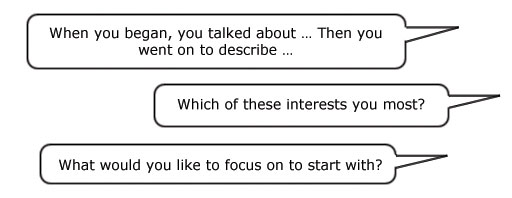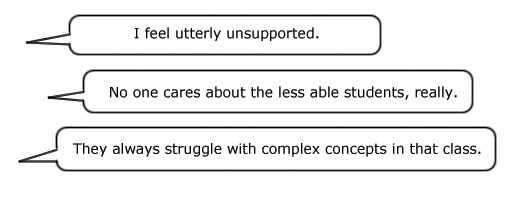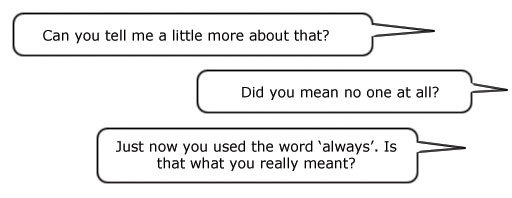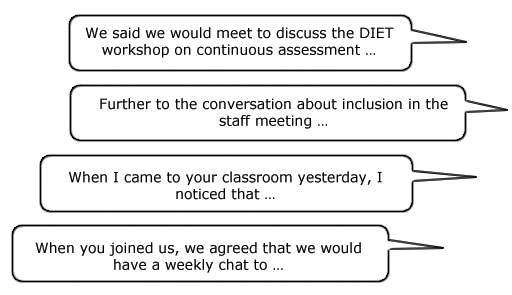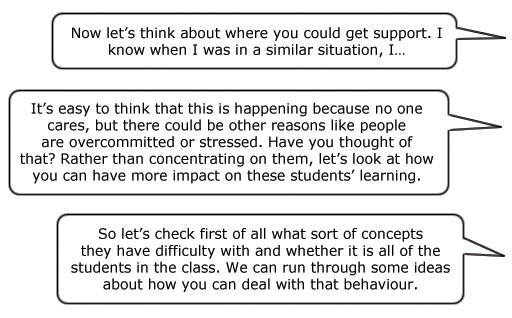2 Preparing for a conversation with a purpose
Good coaches and mentors share many values and practices, and are committed to offer support over a period of time where one conversation leads to another. In this way the relationship of trust can develop; but note also that the influences on teaching and learning arising from mentoring and coaching will only happen over time. The mentor or coach makes sure that the place, time and mood are right for each conversation. Sometimes this will mean a regular weekly session in the same venue; at other times, it will be a more casual encounter. While sometimes the session can be for just a few minutes in a corridor, usually it will take at least half an hour.
The coachee or mentee needs to know that the conversation is focused entirely on them. As a coach or mentor you should ideally choose a time and place to suit them, and where you will not be disturbed.
Figure 2 It is important to consider where you hold a conversation.
There are some really important dos and don’ts regarding the setting of the conversation:
- Turn all mobile phones onto silent and put them away.
- If you are sitting, arrange the seats at an angle to each other and far enough apart so that the mentee or coachee doesn’t feel intimidated. This is especially important if the conversation is between a man and a woman. It is better not to sit behind your desk.
- If you, as the coach, need to take notes, you should ask if it's acceptable. (You should also check whether the coachee wants to take notes as well.)
- Maintaining eye contact is really important, as is nodding to show that you are listening.
- Agree at the start how much time you will spend together.
And now it is time to have the conversation. Firstly you will look at the role of coach and then at the role of mentor.
Preparing for a conversation as a coach
From the moment you start the session, your only focus should be the person with you.
Your first job is to make your coachee feel at ease. After you ask them what they want to talk about, just listen. When they pause, ask them to tell you more.
Stay as still as possible. Anything that distracts the speaker will stop the flow of their thoughts. Watch how they sit and how they hold themselves. Try to mirror their shape in how you sit without being artificial; you might lean forward when they do, or gesture with your hands. Often this mirroring happens very naturally in a flowing conversation.
If your coaching is on a specific topic that you agreed beforehand (see Resource 2 for an example of using coaching to explore CCE), then you still need to listen to what the coachee understands in the first instance.
Coaching can be very tiring, because you have to listen so hard. You need to provide feedback to the speaker on what they are saying, so you sometimes have to work very hard at remembering. Do not be worried about taking notes of a few key words or phrases that you have heard. Coaches normally ask permission, in the form of ‘Would you mind if I took a few notes?’ When you give feedback, as you should regularly, use phrases such as:
This early stage can take quite a while, because the first idea that the coachee talks about may very often not be what is uppermost in their mind. Do not be hasty and push them too soon. Allow the conversation to take its natural course.
Once you are confident that your coachee is clear about what they really want to talk about, you are probably ready to establish with them what they want the outcome of the conversation to be. This might take the form of the following statement, said by you as the coach:
To do this you will need to explore with them what a successful outcome would look like.
Throughout the session, watch how the coachee’s expression changes and how their hands move. These are important clues to their feelings. But most importantly, listen really closely to the words that your coachee uses, for example:
Your response to statements such as these could include:
Coaches call this form of enquiry activity ‘breaking the code’.
Your final task as the coach is to agree the actions from the session and what the coachee is committing to. Get them to write down the actions they intend to take and agree a timescale that they will be completed in. Your session should always end with the coachee making a commitment such as:
By summarising their thoughts and clarifying any remaining uncertainties, your coachee will be much more likely to choose a next step that they are comfortable with adopting and realistic enough to be doable. Finally, repeat to them what they have committed to and, if appropriate, agree the date for your next coaching session.
Preparing for a conversation as a mentor
Putting your mentee at ease is just as important for the mentor as it is for the coach with the coachee. Because you are taking on the role of a more knowledgeable professional, offering your experience and expertise, it is possible that your mentee could be really intimidated by you if you don't start things off well. It is therefore even more important for you to remember that if you remain seated behind your desk, your wisdom will not leave the room with the person who needs it most. The kindness in your eyes, the way in which you draw the mentee into the room, how you settle them comfortably and sit with them – all these things will make starting the conversation much easier.
As before, it is courteous to ask for permission to take any notes and make it clear that the mentee can make notes too, if they wish.
It doesn't matter how you introduce the conversation, but it is likely that it will be as a consequence of a previous interaction:
As before, the mentee should establish what they want to do. To help them with this, it is often useful to summarise what you have heard, what your contribution has been and what areas you have covered together. You should then agree the outcome of the session and what your mentee is committing to.
Activity 3: How does a mentoring conversation differ from a coaching one?
Bearing in mind the differences in the definitions of coaching and mentoring that you read above, write down in your Learning Diary the sort of things that a mentor might say in response to the statements you have already seen:
As you help your mentee to work out how to take their next step, your aim is to help them to reach a successful outcome. You may well take a more active role and begin to bring your experience and expertise into the conversation after you have listened to their concerns and thoughts. It is very important to remind yourself of a simple rule, however. If the idea is yours rather than theirs, then they won't own it. And if they don't own it, they won't succeed in making it happen. As a mentor you should not provide the solution, but be the conduit for the discovery, enabling others to decide on their actions.
Discussion
You might have come up with mentoring responses like these:
1 What coaching and mentoring have in common


